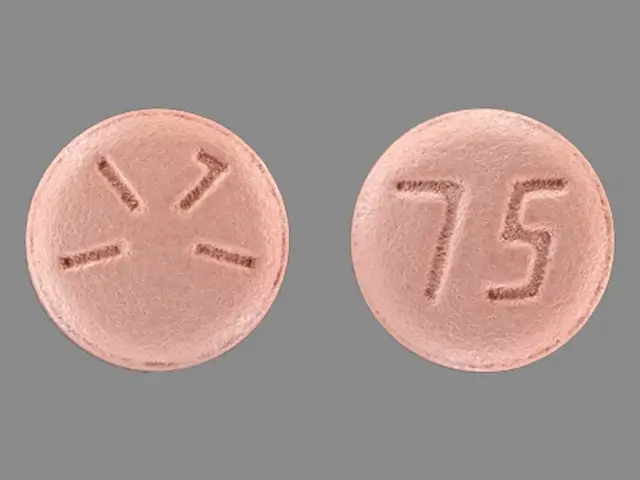What is Plavix?
Plavix is a prescription medicine used to treat people who have any of the following:
1- chest pain due to heart problems
2- poor circulation in their legs (peripheral arterial disease)
3- a heart attack
4- a stroke.
Plavix is used alone or with aspirin to lower your chance of having another serious
problem with your heart or blood vessels such as heart attack, stroke, or blood clot
that can lead to death.
Platelets are blood cells that help your blood clot normally. Plavix helps to
prevent platelets from sticking together and forming a clot that can block an
artery.
It is not known if Plavix is safe and effective in children.
What is the most important information I should know about Plavix?
a). Plavix may not work as well in people who:
1- have certain genetic factors that affect how the body breaks down Plavix. Your
doctor may do genetic tests to make sure Plavix is right for you.
2- take certain medicines, especially omeprazole (Prilosec) or esomeprazole
(Nexium).
Your doctor may change the medicine you take for stomach acid problems while you
take Plavix.
b. Plavix can cause bleeding which can be serious and can sometimes lead to death.
Plavix is a blood thinner medicine that lowers the chance of blood clots forming in
your body. While you take Plavix:
1- you may bruise and bleed more easily
2- you are more likely to have nose bleeds
3- it will take longer for any bleeding to stop.
Call your doctor right away if you have any of these signs or symptoms of bleeding:
1- unexpected bleeding or bleeding that lasts a long time
2- blood in your urine (pink, red or brown urine)
3- red or black stools (looks like tar)
4- bruises that happen without a known cause or get larger
5- cough up blood or blood clots
6- vomit blood or your vomit looks like coffee grounds
Do not stop taking Plavix without talking to the doctor who prescribes it for you.
People who stop taking Plavix too soon have a higher risk of having a heart attack
or dying. If you must stop Plavix because of bleeding, your risk of a heart attack
may be higher.
What should I tell my healthcare provider before taking Plavix?
Before you take Plavix, tell your doctor if you:
1- have a history of bowel (gastrointestinal) or stomach ulcers
2- have a history of bleeding problems
3- plan to have surgery or a dental procedure. See "How should I take Plavix?".
4- are pregnant or plan to become pregnant. It is not known if Plavix will harm your
unborn baby
5- are breastfeeding or plan to breastfeed. It is not known if Plavix passes into
your
breast milk. A decision should be made with your healthcare provider to avoid or
discontinue breastfeeding when continuing Plavix is needed.
6-have had an allergy or reaction to any medicine used to treat your disease.
How should I take Plavix?
1- Take Plavix exactly as your doctor tells you.
2- Do not change your dose or stop taking Plavix without talking to your doctor
first.
Stopping Plavix may increase your risk of heart attack or stroke.
3- Take Plavix with aspirin as instructed by your doctor.
4- If you miss a dose, take Plavix as soon as you remember. If it is almost time for
your next dose, skip the missed dose. Take the next dose at your regular time. Do
not take 2 doses of Plavix at the same time unless your doctor tells you to.
5- If you take too much Plavix, call your doctor or go to the nearest emergency room
right away.
6- Talk with your doctor about stopping your Plavix before you have surgery. Your
doctor may tell you to stop taking Plavix at least 5 days before you have surgery to
avoid excessive bleeding during surgery.
What are the possible side effects of Plavix?
1- Tell your doctor if you have any side effect that bothers you or that does not go
away. Tell your doctor if you develop an allergic reaction including skin reactions
while taking Plavix.
2- These are not all the possible side effects of Plavix. For more information, ask
your doctor or pharmacist.
3- Call your doctor for medical advice about side effects. You may report side
effects
to FDA at 1-800-FDA-1088.
Plavix

Drug Interactions
A total of 234 medications are known to interact with Plavix.
How should I store Plavix?
Store Plavix at 59°F to 86°F (15°C to 30°C).
Keep Plavix and all medicines out of the reach of children.
What are the ingredients in Plavix?
Active ingredient: clopidogrel bisulfate
Inactive ingredients:
Tablet: hydrogenated castor oil, hydroxypropyl cellulose, mannitol, microcrystalline
cellulose, polyethylene glycol 6000
Film coating: ferric oxide, hypromellose 2910, lactose monohydrate, titanium
dioxide, triacetin, Carnauba wax




